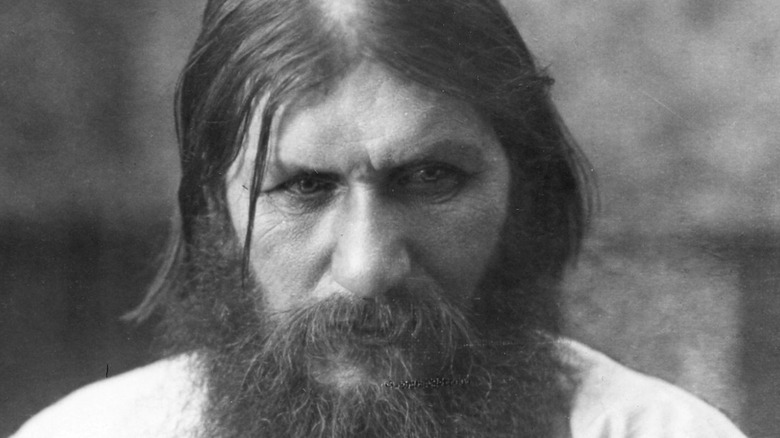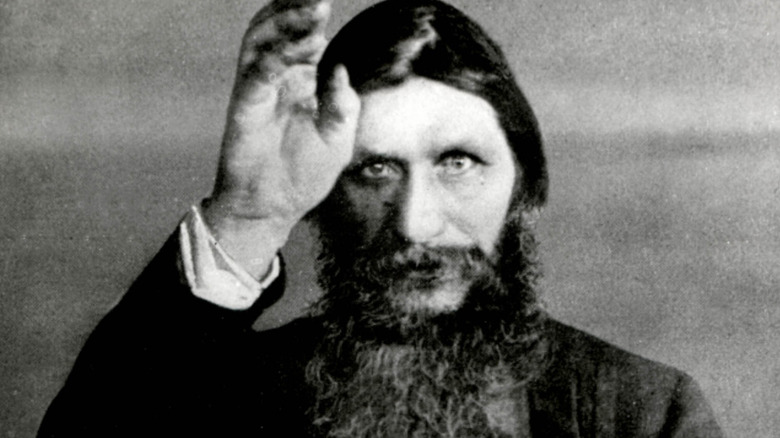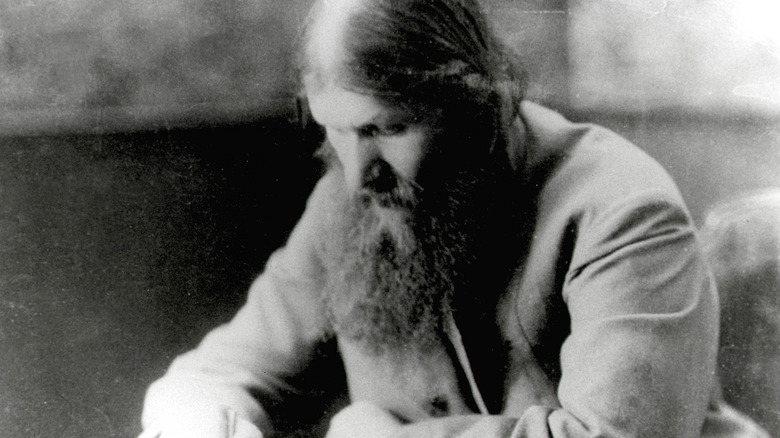Bizarre Things That Don't Make Sense About Rasputin's Death
There are few historical figures more mysterious or more consequential than the so-called "Mad Monk," Grigori Rasputin. Born a peasant farmer in Siberia, Rasputin initially lived a simple, quiet life — working his farm, marrying, fathering several children — but in the 1890s he experienced a dramatic religious conversion and began leading his own ever-growing sect of followers.
His charisma eventually caught the attention of some prominent Russian Orthodox priests, who eventually introduced him to Czar Nicholas II and his wife, Alexandra. Rasputin proceeded to ingratiate himself to them, in part by allegedly healing their son Alexei of his hemophilia, and from there asserted considerable influence over their policy. He had a particularly strong influence over Alexandra, with whom he was rumored, without evidence (via Town & Country), to have had an affair.
With World War I going badly for the Russians, rumors began to swirl about Rasputin — he was controlling the throne, he was engineering military defeats, he was conspiring to spread cholera with poisoned apples (according to the Library of Congress, yes, that was a real rumor that people spread with a straight face) — and his assassination soon became inevitable. According to his assassin, however, Rasputin would prove to be all but impossible to kill.
According to his assassin, Rasputin should have died multiple times
Around midnight, December 30, 1916 (which, locally, was December 17, because Russia was still using the Julian calendar), Russian Prince Felix Yusupov invited Rasputin to the basement of his St. Petersburg residence, Moika Palace, becaue Irina, the prince's wife, wanted to meet Rasputin. It's entirely unclear why Rasputin accepted the invite, since he knew that there was a conspiracy against his life, and there's nothing at all un-suspicious about "Come meet my wife in my basement at midnight." Still, Rasputin showed up (via BBC).
As Yusupov told it in his memoirs, what followed was either a horror movie or a wacky comedy of errors, depending on your perspective: First, Yusupov offered Rasputin cakes and wine that were both laced with potassium cyanide. While Rasputin ate and drank heartily, he seemed entirely unaffected by the poison, remaining alert and asking when he would get to meet Irina. Around 2:30 a.m. Yusupov grew impatient, and shot Rasputin several times in the chest. Yusupov and his co-conspirators then left the palace briefly for alibi purposes, but when they returned the formerly-dead Rasputin rose up and attacked Yuspov (via History).
After a mighty struggle, Rasputin was finally felled again, with several more shots to the back, after which they tied him up and dumped him in a river. Allegedly, though, when the body was examined, the pathologist announced the cause of death was drowning; neither the bullets nor the poison had ended his life. The icy river had had to do it.
But actually, Rasputin's death was a lot less dramatic than that
Yusupov's account of Rasputin's death is a great one, but unfortunately, there's not a lot of evidence for it. For starters, the official autopsy report lists the cause of death as a gunshot to the head, and makes no mention of water in the lungs, the tell-tale sign of drowning. Further, it mentions no presence of poison in Rasputin's body.
That last bit is hardly surprising when you consider that, according to Rasputin's daughter Maria, he never would have eaten a plate of cakes. He didn't care for sweets; according to certain reports, he believed them to repress his clairvoyance and miracle-working. So, as cool as it is to imagine a possessed monk repeatedly cheating death, the popularly believed account almost definitely isn't true.
Things look even more dubious when you consider that Yusupov had seemingly every possible motivation to exaggerate the struggle. Prior to the assassination, he had been perceived as something of a dilettante, lounging about his palace while Russian commoners were dragged off to fight in an unpopular war. The account in his memoir was clearly an attempt to resuscitate his public image (via Smithsonian). Given that many people still believe his story to this day, it apparently found some success.
Supernatural powers or not, though, Rasputin was clairvoyant, or at least prescient, about one thing: In a letter to Nicholas II, he had predicted that his murder would bring down the monarchy. In 1917, Nicholas was forced to abdicate.


